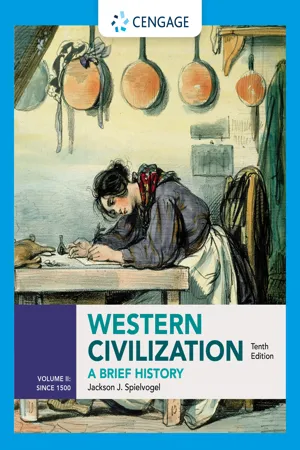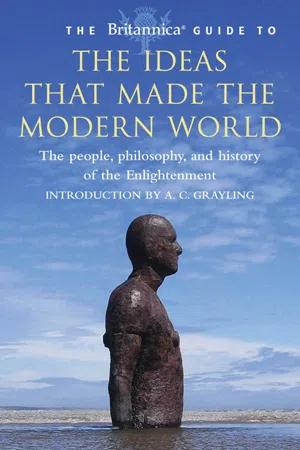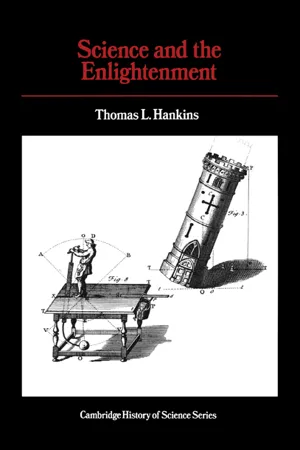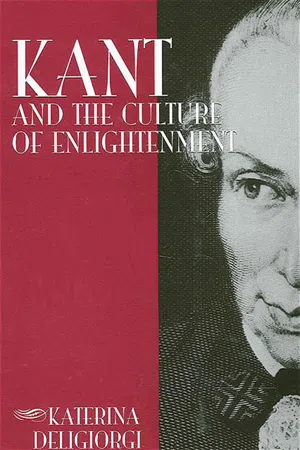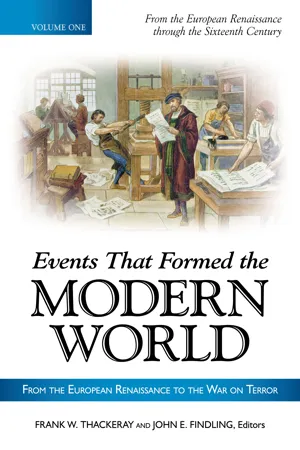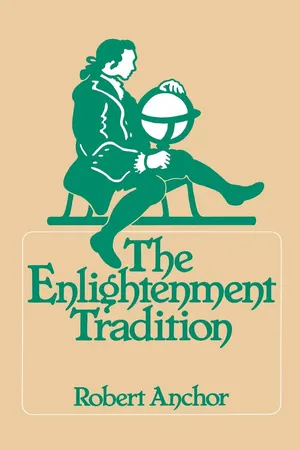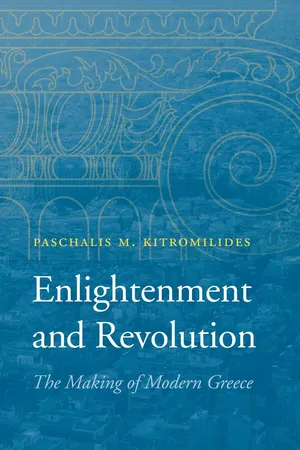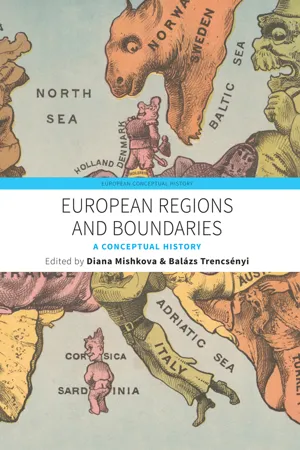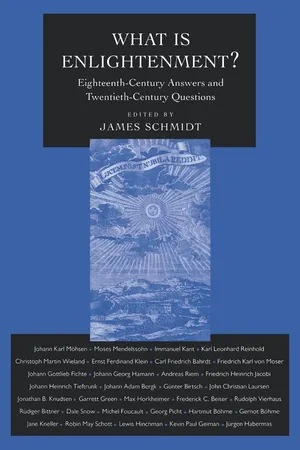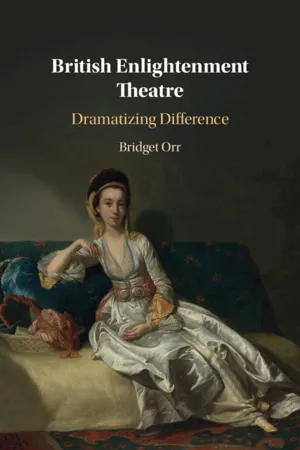Literature
Enlightenment Literature
Enlightenment literature refers to the literary works produced during the Enlightenment period, which was characterized by a focus on reason, science, and individualism. Writers of this era sought to challenge traditional authority and promote rational thinking, often addressing social and political issues through their works. Notable figures of Enlightenment literature include Voltaire, Rousseau, and Mary Wollstonecraft.
Written by Perlego with AI-assistance
Related key terms
1 of 5
11 Key excerpts on "Enlightenment Literature"
- eBook - PDF
Western Civilization
A Brief History, Volume II since 1500
- Jackson Spielvogel(Author)
- 2019(Publication Date)
- Cengage Learning EMEA(Publisher)
Ironically, at the same time that reason and materialism were beginning to replace faith and worship, a great outburst of religious sensibility manifested itself in music and art. Clearly, the grow- ing secularization of the eighteenth century had not yet captured the hearts and minds of all European intellectuals and artists. 17-1 THE ENLIGHTENMENT Q Focus Questions: What intellectual developments led to the emergence of the Enlightenment? Who were the leading figures of the Enlightenment, and what were their main contributions? In what type of social environment did the philosophes thrive, and what role did women play in that environment? In 1784, the German philosopher Immanuel Kant (i-MAHN-yoo-el KAHNT) (1724–1804) defined the Enlightenment as “man’s leaving his self-caused immaturity.” Whereas earlier periods had been handi- capped by the inability to “use one’s intelligence with- out the guidance of another,” Kant proclaimed as the motto of the Enlightenment: “Dare to know! Have the courage to use your own intelligence!” The eighteenth- century Enlightenment was a movement of intellectuals who dared to know. They were greatly impressed with the accomplishments of the Scientific Revolution, and when they used the word reason—one of their favorite 390 ■ CHAPTER 17 The Eighteenth Century: An Age of Enlightenment had embarked on voyages of discovery to other parts of the world in the late fifteenth and sixteenth centuries. In the course of the seventeenth century, traders, mis- sionaries, medical practitioners, and explorers began to publish an increasing number of travel books that gave accounts of many different cultures. Then, too, the new geographic adventures of the eighteenth century, especially the discovery in the Pacific of Tahiti, New Zealand, and Australia by the British explorer James Cook, aroused much enthusiasm. Educated Europeans responded to these accounts of lands abroad in differ- ent ways. - eBook - PDF
- Encyclopaedia Britannica, Inc.(Authors)
- 2008(Publication Date)
- Encyclopaedia Britannica, Inc.(Publisher)
1 A HISTORY OF THE ENLIGHTENMENT The Enlightenment (in French the Sie Ácle des Lumie Áres ( ``Age of the Enlightened''), in German Aufkla È rung ) swept through Europe in the 17th and 18th centuries. With new ideas con-cerning God, reason, nature, and man, the Enlightenment offered a world view that gained wide assent and instigated revolutionary developments in art, philosophy, and politics. Central to Enlightenment thought were the use and the cele-bration of reason, the power by which man understands the universe and improves his own condition. The goals of ra-tional man were considered to be knowledge, freedom, and happiness. The Enlightenment was both a movement and a state of mind. The term represents a phase in the intellectual history of Europe, but it also serves to define the programmes of reform advocated by influential French writers, philosophers, and scientists, known as ``philosophes'', who were inspired by a common faith in the possibility of a better world. The special significance of the Enlightenment lies in its combination of principle and pragmatism. There are two traditional schools of thought regarding its character and achievements. The first sees the Enlightenment as the preserve of an elite centred on Paris and as primarily a French movement, while the second perceives it as an inter-national phenomenon with as many facets as there were countries affected. Although most modern interpreters incline to the latter view, there is still a case for the French emphasis, given the genius of a number of the philosophes and their associates. Unlike other terms applied by historians ``the Enlightenment'' was used and cherished by those who believed in the power of the mind to liberate and improve. - eBook - PDF
The History of Reason in the Age of Madness
Foucault’s Enlightenment and a Radical Critique of Psychiatry
- John Iliopoulos(Author)
- 2017(Publication Date)
- Bloomsbury Academic(Publisher)
1 What Is Enlightenment? The Enlightenment is a diverse and complex phenomenon. Its historical origins are difficult to locate, and there is no general consensus on how to determine its goals and objectives. 1 It is for these reasons that the question of the Enlightenment has stirred so much controversy among thinkers. Broadly associated with an intellectual movement that took place around the eight-eenth century, the Enlightenment has been considered as defying tradition, authority and religion, on the basis of rational inquiry and autonomy. Rationality is viewed as central to the efforts of the Enlightenment thinkers to free humanity from myth and superstition. But the importance that rationality has come to occupy in this movement has divided its critics. Many scholars have celebrated the emergence of the Enlightenment’s faith in rationality and progress, which has given rise to the scientific study of man, to the primacy of the subject and to a humanist discourse. Others mistrust the Enlightenment, maintaining that its adherence to reason has generated irrational practices, which have resulted in abuses of power and totalitarian regimes. 2 Owing to these diverse and opposing attitudes, Foucault’s own involvement with the Enlightenment has been subject to conflicting interpretations. His work is still the object of an ongoing debate about the position he occupies in relation to the Enlightenment. One trend of thought regards Foucault, along with thinkers such as Derrida, Lyotard and Rorty, as a postmodern thinker. 3 Postmodernism is in many ways considered as a counter-movement to the Enlightenment. Whereas the Enlightenment thinkers are generally regarded as proponents of rationality, objective truth and science whose telos, or end, is to liberate mankind from prejudice through the acquisition of ever-more precise knowledge, postmodernism is sceptical of objectivity and truth, thereby distrusting metanarratives, which claim conceptual mastery of the - eBook - PDF
- Thomas L. Hankins(Author)
- 1985(Publication Date)
- Cambridge University Press(Publisher)
I. The Character of the Enlightenment Several older studies that are still of great value to the historian of science are Basil Willey, The eighteenth century background, studies 191 192 BIBLIOGRAPHIC ESSAY on the idea of nature in the thought of the period (New York, 1940); Ernst Cassirer, Philosophy of the Enlightenment, trans. Fritz C. A. KoeUn and James P. Pettegrove (Boston, 1951); and Preserved Smith, A history of modern culture, 2 vols. (New York, 1930), reis- sued in 1962 as The Enlightenment, 1687-1776. Willey's book is, as the tide says, an investigation into the idea of nature during the Enlightenment; Cassirer's is more philosophical, with a neo- Kantian slant; and Smith's covers all of Enlightenment "culture," including the natural sciences. A modern study that I have used with great benefit is Peter Gay's The Enlightenment, an interpreta- tion, 2 vols. (New York, 1969), especially vol. 2, "The science of freedom." Isaiah Berlin, The age of Enlightenment (New York, 1960), and George R. Havens, The age of ideas, from reaction 10 revolution irt eighteenth-century France (New York, 1955), are good introduc- tions. Science and literature are the subject of Marjorie Hope Nichol- son's Newton demands the muse: Newtort's "OPticks" and the eigh- teenth-century poets (Princeton, 1946), and Science and imagination (Ithaca, 1956). The iloges at the Paris Academy of Sciences were important literary statements about science and scientists during the Enlightenment; their history is well documented in Charles B. Paul, Science and immortality, the ilogcJ' of the Paris Academy of Sciences (1699-1791) (Berkeley, 1980). L B. Cohen's "The eighteenth- century origins of the concept of scientific revolution," Journal of the History of Ideas 37 (1976), 257-88, is the best source for infor- mation on this interesting topic. Newton appeared in the Enlightenment as a heroic figure and also as a contributor to the solution of specific scientific problems. - eBook - PDF
- Katerina Deligiorgi(Author)
- 2012(Publication Date)
- SUNY Press(Publisher)
Chapter 1 The Enlightenment in Question 1. Enlightenment as an “Age of Criticism” One of the difficulties encountered when reflecting about the Enlightenment is to determine first of all what the object is. This is not just a demand for geographical and historical precision, but also, importantly, for identifying the set of ideas under discussion, the con- tent so to speak of the term. But therein lies the difficulty: “Enlightenment” is descriptively elusive. There is no date or concept that we can afford to take as our unproblematic, self-evident starting point. Taking our cue from the darkness-dispelling metaphor that is Enlightenment, however, we can begin by asking: How are darkness and light apportioned? How is illumination to be brought about? In terms of what we have come to view as the characteristic concerns and ambitions of the “Age of Reason,” the answer to these questions is obvious: the way to secure intellectual progress and human happiness is by eradicating superstition and by setting the various branches of human knowledge on a sound scientific footing. Familiarity with the aspirations of this optimistic, progress-oriented Enlightenment, how- ever, has tended to obscure a strand of eighteenth-century thinking that offers a more cautious view of the future and questions the nature and achievements of both “enlightenment” and “civilization.” The aim of this chapter is to flesh out the questions this critical Enlightenment raises about the social and cultural context of reasoning, the reliability of reason as a guide for human action, and, finally, the nature, powers, and limitations of human rationality. In his now classic study of the period, The Philosophy of the Enlightenment, Ernst Cassirer observes that “‘Reason’ becomes the 13 - eBook - ePub
Events That Formed the Modern World
From the European Renaissance through the War on Terror [5 volumes]
- Frank W. Thackeray, John E. Findling, Frank W. Thackeray, John E. Findling(Authors)
- 2012(Publication Date)
- ABC-CLIO(Publisher)
The conviction that humanity is progressing along rational lines also led to the establishment of strictly patriarchal conceptions of marriage and family that became embedded in the revisions of national law that “enlightened” despots, such as Frederick the Great of Prussia, promulgated in their kingdoms. Frederick’s revision of law was hailed as an embodiment of Enlightenment ideals. In the section on the “familystate,” Frederick outlined the family structure that would prevail in Prussia: “Hence it follows, judging by the sole light of reason, that the husband is master of his own household, and head of his family. And as the wife enters into it of her own accord, she is in some measure subject to his power.”The wife is seen not as an individual, but as the husband’s “assistant” in the family. Such changes in the law, based on Enlightenment principles, can be seen at their strictest in the law code promulgated by Napoleon, which designates men as the only political and legal “persons” in the empire and substantially limits the rights of women, some of which, such as inheritance of land, they had previously enjoyed during the so-called Dark Ages.The belief in the ability of rational men to construct rational structures, ones governed by immutable and universal laws, led to changes not only in legal codes and government but also in the fine arts, literature, and music. The rejection of the baroque as an artistic style that emphasized the artificial and the decorative elements in art and music and the adoption of neoclassicism as a “natural” and “rational” style constituted a significant step in the development of Enlightenment ideals. The eighteenth century witnessed the development of strict laws of musical composition, as well as of artistic style, that emphasized proportion, balance, and simplicity, in contrast to the florid and exuberantly complex decorative style of the baroque. It was also the era in which the modern novel was developed, a literary genre bounded by strict rules even though novelists tended to chafe against the restrictions of the form. Poetry and drama were also made to conform to “rational” strictures; the poetry and drama of the ancient world, in particular of Greece in the fifth century B.C. , became the literary model, just as fifth-century architectural styles became the model for the designers of châteaux and manor houses in Europe and of public buildings and universities in America.The Enlightenment was above all an intellectual movement. Despite its popularity among the learned community, the precepts of the movement did not always translate smoothly into practical political activity. In many ways, the political and social tensions of postrevolutionary Europe illustrate the problems inherent in applying Enlightenment ideology to actual events. The French Revolution was claimed by its proponents to be a direct outgrowth of the Enlightenment: it was a movement that based its principles on Lockean and Rousseauian models of the social contract; it proclaimed the rights of the individual; it rejected the authority of the established Church. Even its mode of execution—the guillotine—was considered to be rational, humane, and a product of advanced technology (as well as being efficient). The supporters of the French Revolution were initially empowered by its success. Authors, such as Mary Wollstonecraft, who defended the actions of the French revolutionaries could justify further political radicalism (such as Wollstonecraft’s defense of the rights of women) as being the rational outcome of the Enlightenment program. - eBook - PDF
- Robert Anchor(Author)
- 2023(Publication Date)
- University of California Press(Publisher)
THE ENLIGHTENMENT AS CULTURAL REVOLUTION: ORIGINS As late as 1748, however, little change was apparent on the surface of French society. Church and state seemed as stable and secure as ever. The king was still popular after a successful war, and the parlements and Jansenists had as yet made little headway in their struggle against absolutism and the Jesuits. The Enlightenment was not yet a coherent movement, but only a conception taking shape in the minds of a scattered handful of individual thinkers, writers, and social critics. Nothing at this time suggested that the Old Regime could not continue to main- tain itself. But, as we have seen, decisive social and political regroupings were in process between 1715 and 1748. Then in 1748 appeared Montesquieu's The Spirit of the Laws, Hume's Inquiry Concerning Human Understanding, La Mettrie's Man a Machine; in 1749 Diderot's Letter on the Blind; in 1750 Rousseau's first discourse; in 1751 the first 34 T H E E N L I G H T E N M E N T AS C U L T U R A L R E V O L U T I O N 3 5 volume of the Encyclopedia; and in 1755 Morelly's Code of Nature, the first modern conception of a communist so- ciety. The brief period during which these and many other important writings appeared marks the point at which the forces at work below the surface came to the fore and began to gain the upper hand. Montesquieu and the Problem of Society In tracing this early phase of the Enlightenment, we must go back to the greatest literary work of the Regency. Montesquieu's The Persian Letters (1721), the first great writing of the first great phUosophe. A sharp, satirical criti- cism of contemporary France, it continued the spirit of seventeenth-century philosophy. Descartes' rationalism, Locke's empiricism, the scepticism of Pierre Bayle, all con- tributed to the undermining of men's confidence in the past as a guide to action in the present. - eBook - PDF
Enlightenment and Revolution
The Making of Modern Greece
- Paschalis M. Kitromilides(Author)
- 2013(Publication Date)
- Harvard University Press(Publisher)
C H A P TE R E I G HT The Enlightenment as Social Criticism THE WILL TO criticism was the defining characteristic of the Enlightenment. The conscious pursuit of criticism can be seen as the underlying mental atti-tude that reconciled the diverse outlooks that made up the Enlightenment. Criticism and doubt toward established beliefs and accepted authority rep-resented the most daring manifestations of the early Enlightenment in a period of “crisis for the European conscience.” 1 Later on, social criticism and the vision of social reconstruction that activated it was what made Rous-seau, and his opponents among the philosophes, representatives of the same intellectual movement. 2 The sharpest edge of Enlightenment criticism was directed against conventional Christianity, the Church, and the censorship imposed by it. Christianity constituted the rival set of beliefs that fostered uncritical faith and by extension, in the eyes of the Enlightenment, superstition. It sym-bolized, that is, everything that the Enlightenment was fighting against. In this ideological confrontation, the Church and the various mechanisms of censorship formed the formidable structure of organized power that stood in the way of the progress of the Enlightenment, by taking advantage, according to its opponents, of prejudices that were hypnotizing the human TH E E N LI G HTE N M E NT A S S O C I A L C R ITI C I S M 231 spirit. For this reason, the Church strove to strangle the movement that was threatening to rend the veil of ignorance and had, ever since the period of the Renaissance in European culture, persecuted those who labored in the interests of the progress of knowledge. The struggle between the Enlight-enment and the Church can thus be seen as the fundamental ideological fissure in European society during the eighteenth century. - eBook - PDF
European Regions and Boundaries
A Conceptual History
- Diana Mishkova, Balázs Trencsényi, Diana Mishkova, Balázs Trencsényi(Authors)
- 2017(Publication Date)
- Berghahn Books(Publisher)
Chapter 16 Literary History Alex Drace-Francis Before the Enlightenment, the term “literature”—which did not originally refer to belles-lettres or works of fiction—was used in a fairly general way, in Latin or in the west European vernaculars, to denote intellectual authorities, corpora of sources, or traditions of learning or interpretation; a sense which is preserved in the meaning of “scholarly literature” or bibliography (Williams 1977). As such, it was understood as a body of material transcending geogra-phy, even if there was an implicit understanding of a transfer of learning from an origin point, perceived as the Eastern Mediterranean, to the northwest of Europe (the so-called translatio studiorum ). Literary history, then, was equiv-alent to the general history of knowledge. And despite radical transformations of the concept over time, most attempts to write comparative literary history have remained—whether by accident or willful occlusion—remarkably indif-ferent to coherent geographical systematizations. This is not to say that all older attempts to consider “the state of learning in Europe” were bound to a universalistic interpretation of the classical and Biblical heritage as the building blocks of literary knowledge in modern Eu-rope. For example, British scholar and editor of manuscripts Samuel Purchas, who sketched “A Briefe and Generall Consideration of Europe” in 1625, had recourse to a division of the continent based on the different languages spo-ken in it (Purchas [1625] 2013). But his divisions rested primarily on identifi-cation of languages and language families, and he did not seek to delve further into the literary traditions they perpetuated, either by nation or region. From Exchange to Division: The Republic of Letters and the Legacy of De Staël It was in the course of the eighteenth century that the concept of literature is generally agreed to have undergone its most important transformations. - eBook - PDF
- James Schmidt(Author)
- 1996(Publication Date)
- University of California Press(Publisher)
Introduction What Is Enlightenment? A Question, Its Context, and Some Consequences James Schmidt The Enlightenment has been blamed for many things. It has been held re-sponsible for the French Revolution, for totalitarianism, and for the view that nature is simply an object to be dominated, manipulated, and ex-ploited. It has also been implicated in one way or another in European imperialism and the most aggressive aspects of capitalism. While some have insisted that its skepticism about absolute values infects our culture with a nihilistic sluggishness, others have suggested that liberal societies should divest themselves of the Enlightenment's obsession with philosophical foun-dations. I It is said that its passion for rights and liberties unleashed a de-structive individualism that undermines any sense of community.2 Yet it has also been argued that its assumption that human nature was infinitely malleable has provided the intellectual inspiration for attempts by total-itarian states to eradIcate all traces of individuality from their subjects. 3 It has been criticized for its insensitivity to the tragic character of moral con-flicts and for its naive assumption that all dilemmas have simple solutions. 4 It has been argued that its attempt to construct a moral philosophy ended in failure, leaving us with either an impoverished moral vision that sup-presses all values that cannot be reduced to instrumental efficiency or a corrupted moral discourse in which ethical evaluations are nothing more than a mask for individual preferences. s It has been castigated for its affec-tion for master metanarratives and its hostility toward otherness.6 Its racism and its sexism have not passed unnoticed. 7 Looking over this list of charges, one wonders how one period could have been responsible for so much and so many different kinds of harm. - eBook - PDF
British Enlightenment Theatre
Dramatizing Difference
- Bridget Orr(Author)
- 2020(Publication Date)
- Cambridge University Press(Publisher)
Humberto Garcia, Islam in the English Enlightenment, – (Baltimore: Johns Hopkins University Press, ). English Enlightenment these views were broadly shared in a nation that not only served as an implicit political model for writers like Voltaire but had individuals and communities who sympathized with the more radical views of the Lumières. England’s Enlightened Theatre While the revolutionary effects of print culture are undeniable, the bur- geoning studies of the history of the book have been a mixed blessing for theatre studies, tending to reinforce the traditional belief in the ‘rise of the novel’ as the most salient aspect of literary culture in the Enlightenment. Recent scholarship has modified this assessment radically, showing how developments in theatre including dramaturgy, scenography, new modes such as pantomime and spectacle and the cults of celebrity performers and their commodification all reveal the continuing cultural salience of the stage in eighteenth-century culture, rather than its decline and eclipse by fiction. Not only was there considerable overlap between writers of plays and fiction, the emergent novel drew on a wide variety of dramatic techniques, ranging from character types to dialogue, gesture and scene to structure and embody narrative. It is well understood by drama historians that English theatre was one of the most important venues in which political disputes over the Revolution and the late Stuart and Hanoverian regimes were played out for the public. A scholarly legacy in which John Loftis’s foundational work has been extended by Jean Marsden, Richard Braverman, Elaine McGirr, Brett Wilson and others has made it clear how debates over legitimate sover- eignty, foreign and colonial policy, threats of counterrevolution, the nature of patriotism and the proper role of religion in the state were repeatedly depicted on stage.
Index pages curate the most relevant extracts from our library of academic textbooks. They’ve been created using an in-house natural language model (NLM), each adding context and meaning to key research topics.
